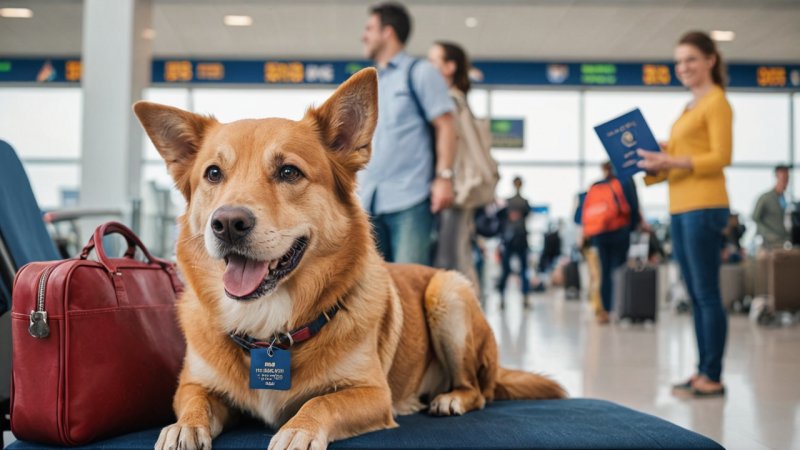Traveling with pets can be one of the most rewarding experiences for both you and your furry companions. However, pet owners must navigate a variety of regulations and requirements before embarking on their adventures. One essential aspect of international travel with pets is understanding the importance of pet passports. This article explores the intricacies of pet passports, the requirements for different countries, and tips for ensuring a smooth travel experience for you and your pet.
Understanding Pet Passports
A pet passport is an official document that provides information about a pet's identity and health status, enabling pets to travel across international borders. It contains details such as the pet's microchip number, vaccination records, and health certificates. While not all countries require a pet passport, having one can significantly simplify the process of taking your pet abroad.
The Components of a Pet Passport
Typically, a pet passport includes the following key components:
- Identification: A clear description of the pet, including breed, age, color, and microchip details.
- Vaccination Records: Proof of vaccinations, particularly against rabies, is essential for international travel.
- Health Certificate: A veterinarian's statement confirming that the pet is free from contagious diseases and fit for travel.
- Travel History: An account of previous travel undertaken, if applicable.
Country-Specific Requirements
Each country has its own set of regulations regarding pet travel, and understanding these is crucial for a hassle-free journey. Here’s a look at some common requirements for popular destinations:
European Union
In the EU, a pet passport is recognized and required for dogs, cats, and ferrets traveling between member states. Pets must be microchipped, vaccinated against rabies (at least 21 days before travel), and must have a health certificate signed by an authorized veterinarian.
United States
The U.S. does not have a standardized pet passport system. However, various states and airlines may have specific health certificate requirements, particularly for rabies vaccinations. Check the destination state's guidelines for the most accurate information.
United Kingdom
For pets entering the UK, you will need to comply with the Pet Travel Scheme (PETS). Pets must be microchipped, vaccinated against rabies, and must undergo a tapeworm treatment before travel. A pet passport can simplify the process.
Australia and New Zealand
Both Australia and New Zealand have strict biosecurity laws. They require pets to undergo a series of vaccinations and tests several months before travel. A pet passport is vital, but additional paperwork may be needed for entry.
Preparing for International Travel with Pets
Once you understand the requirements for your destination, preparation becomes crucial. Here are some steps to streamline the process:
1. Consult Your Veterinarian
Before planning your trip, consult with your veterinarian about the requirements for your destination. They can help ensure your pet is up-to-date on vaccinations and provide necessary health documentation.
2. Obtain a Pet Passport
If required, make sure to obtain a pet passport well in advance. This involves microchipping your pet, getting them vaccinated, and ensuring their health records are in order.
3. Check Airline Policies
Different airlines have varying policies regarding pet travel. Check with your airline to understand their requirements, including carrier specifications, in-cabin travel policies, and any additional fees.
4. Prepare Your Pet for Travel
Help your pet adjust to travel by introducing them to their carrier, taking them on short trips, and familiarizing them with the sights, sounds, and smells of travel. Consider their comfort during the journey, providing them with familiar items such as blankets and toys.
Unique Experiences When Traveling with Pets
Traveling with your pet opens up opportunities for unique experiences. Here are some ideas to enhance your journey:
1. Pet-Friendly Destinations
Many cities and countries are increasingly accommodating towards pets. Research pet-friendly hotels, restaurants, and parks. Destinations like Paris, France and Vancouver, Canada, are known for their pet-friendly atmospheres.
2. Outdoor Adventures
Consider destinations with outdoor spaces that welcome pets. National parks, beaches, and hiking trails can be excellent choices for a fun bonding experience with your pet.
3. Local Pet Events
Check for local pet events or festivals during your travel. This can be a great way to meet fellow pet owners and engage in fun activities together.
Common Challenges and Solutions
Traveling with pets may come with its own set of challenges. Here are some common issues and how to overcome them:
1. Health Concerns
Pets can experience stress during travel. Consult your veterinarian about calming solutions or medications if your pet is particularly anxious.
2. International Restrictions
Before traveling, ensure you are aware of any quarantine or restriction policies in your destination country. Some countries may require pets to undergo quarantine upon arrival.
3. Unfamiliar Environments
Pets may react differently to new environments. Make sure to create a safe and comfortable space for them in your accommodation, and be mindful of their behavior in unfamiliar settings.
Conclusion
Traveling with pets can be a fulfilling and memorable experience if you're well-prepared. Understanding the role of pet passports and the specific requirements for your destination is crucial for a smooth journey. By planning ahead, consulting with professionals, and being aware of your pet's needs, you can explore the world together while creating lasting memories. Remember, the key to successful travel with your furry friend lies in thorough preparation and flexibility during your adventures.






